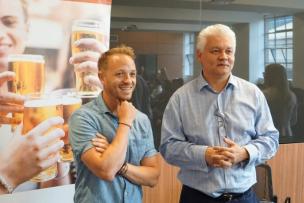Ram Parasuraman got an MBA from IE three years ago. Since then, he's leveraged his decade of software engineering experience to work as a product manager at Cisco.
Ram Parasuraman is Entrepreneurial Product Leader at Cisco. He studied software engineering at Madras and Purdue up to Masters level before working as an engineer for a decade. He then did an MBA at IE Business School.
You have a Masters degree in engineering, but also an MBA. Tell us a bit about your studies and how they were part of your career path.
Well, I would say in my current role I use about 75% of my business brain, and 25% of my technical brain (but of course they can't always be easily dileneated.) But you'll get different answers from different people. Even within the project management team, there are people with different backgrounds.
In my role it certainly helped that I had ten years of technical experience behind me. The function and the role demands business understanding, therefore the MBA was essential. Engineering was my foundation, and it prepared me well. If I hadn't been an engineer, I wouldn't understand which features support the technology, and so on. What the MBA did was shape my thinking. Before that, I only really looked at what code to use. Now it's about sourcing materials, costing and a broader approach to the whole business, naturally. But the engineering years were invaluable.
Do you need a background in engineering to work at Cisco?
There are people you do see who are successful, but they are generally just numbers-focused: they're managing the numbers rather than the products. Obviously at places like McKinsey and so on you can get by on analytical skills. Cisco is a little different: MBAs with some engineering background will have more chance of success here.
Having said that, though, my director doesn't have an engineering background, and he's superb. But obviously our whole company is about innovation and technology, so it helps if you've at least got a high level of understanding about that.
Any tips for MBA students wanting to apply to Cisco?
Keep current with technologies. You need to know if technologies are becoming obsolete, what's new, what the trends are. Stay up-to-date with all that. The other thing that everybody who works here needs is an entrepreneurial mindset. So show that in your application, because you'll need it when working here. It's important to know how to get beyond organisational hurdles and get a job done.
What does your role at Cisco Systems involve on a day-to-day basis?
I'm a product manager, and what I do is become the CEO of the particular product I'm assigned. You take care of everything related to selling the product, pitching it to customers, creating general awareness - the full life cycle of the product. But it's not just one product, it's a series of products. It's a bit like a family: there are babies but also old ones. So you bring the babies into the world, spread awareness, see them through. But you also have to take care of existing products, and make sure they're still doing the job. Products coming to the end of their life span, which are nearly obsolete, obviously need to be managed differently and phased out.
So would you say marketing is a major part of your job?
We have a portfolio of products. Cisco is a huge business, with so many different price points. But yes, segmenting the market into different geographies and areas, and working out plans for selling it, is an important part of the task.
How would you describe the internal working culture of Cisco?
It's difficult to generalise, because it's a vast ocean; a huge company. But I can talk about my division. We don't look at people's titles or positions, there's a free flow of information from marketing to design to everything. People are assigned responsibilities but go beyond these.
Do you enjoy being at Cisco?
Cisco is a fascinating place to work, simply because of the way it brings so many things together. For example, we're doing a lot of work in terms of expanding wi-fi access and mobility, such as for buses and trains. This is using multiple software technologies. That brings in all sorts of people with every skill you can think of. That's what's unique about Cisco. We're also doing
immersive telepresence. That experience is extraordinary; talking to someone on the other side of the globe as if you're right in front of them. As well as of course cutting carbon footprints and all that.
Any final words of wisdom for MBAs thinking about their career options?
It's a cliche but it's true: find something you're passionate about and chase that dream. There are no limits to what you can achieve - so long as you know what you want to do.
Student Reviews
My Review
Madrid Is incredible, I've had a fantastic time at IE University. I've had some excellent lecturers overall. They sincerely want the students to flourish and are concerned about developing a personal relationship with them. Having said that, students typically must fulfil their half of the contract by putting in the necessary work and demonstrating a desire to achieve success.
Coming Master
I spent 1 semester on my Erasmus during my BBA trip. This was the great experience and after that I decode to enroll for the master program there. I must say that the only disappointing fact is connected to distribution of the students. Master students are being connected to the old campus what is not fully fail.
Former BBA
As the former BBA student I can say that the level of the learning is quite high. In addition the place (IE Tower) is probably one of the most innovative and networking-support place in the Europe. I totally recoupment this Uni for business students.
International focus
IE university has a global perspective and attracts a highly diverse student body, with students from all over the world. This international environment fosters cross-cultural understanding and prepares students to work in a globalized world. This is same for the faculty members as well, the university's faculty members are from diverse parts of the world and are reputable. they are not only experts in their fields but are also often actively engaged in research and industry. Their practical experience and academic expertise create a stimulating learning environment.
Loved it
IE University, in my experience as a student, stands out as an outstanding institution for higher education. Its international perspective is a major strength, evident in the diverse student body that represents a multitude of countries and cultures. Interacting with such a global community has broadened my horizons and deepened my understanding of various subjects, providing a rich and comprehensive educational experience.
The quality of the faculty at IE University is exceptional. Many professors bring real-world experience to the classroom, making the learning process more practical and relevant. This approach not only enhances engagement with coursework but also ensures that students are well-prepared for their future careers. The accessibility of professors and their willingness to engage with students personally fosters a collaborative and supportive learning environment.
Practical learning is another significant advantage at IE University. The integration of real-world projects, internships, and case studies bridges the gap between theory and practice. This emphasis on hands-on experience equips students with practical skills and industry insights, making them more competitive in the job market.
IE University offers a wide range of programs across various fields of study, making it a versatile choice for both undergraduate and postgraduate students. This diversity ensures that individuals can find a program that aligns with their academic and career interests.
However, like any institution, IE University has its challenges. The cost of attending can be a major concern for some students, as tuition fees are relatively high. While scholarships and financial aid are available, not all students may qualify for them. This financial aspect is an important consideration, particularly for those with budget limitations.
The competitive nature of some courses and programs can create a high-pressure environment. While competition can be motivating for some, it may also lead to stress for others. Maintaining high academic standards can be demanding, and students should strive for a balance between excellence and well-being.
The workload can be quite challenging, especially for students undertaking double degrees or heavily involved in extracurricular activities. Effective time management is essential to manage academic demands while maintaining a healthy work-life balance.
In conclusion, I would recommend IE University to prospective students with specific considerations. If you value an international perspective, practical learning, and a diverse educational environment, IE University is an excellent choice. However, it's crucial to carefully weigh the tuition costs against the benefits and to be prepared for the competitive nature of some courses. Students should also be ready to handle a demanding workload. IE University has provided me with a rich and globally-focused education, equipping me for a career in an interconnected world. Ultimately, it's important to make an informed decision based on your educational and financial goals, along with a willingness to confront the challenges that may arise.
Rather Exciting
As a student at IE University, enrolled in the Business Administration program, I can confidently say that my experience at this institution has been overwhelmingly positive. IE University's innovative approach to education stands out as one of its most remarkable features. The interactive classes and focus on critical thinking, particularly through the use of case studies, have significantly enhanced my ability to apply theoretical knowledge to real-world business scenarios. Additionally, the global perspective at IE University, fostered by the diverse student body and international faculty, has broadened my understanding of global business practices, which is crucial in the field of Business Administration.
The university's strong industry connections have proven to be invaluable. These connections provide students with numerous internship opportunities and networking prospects, allowing us to gain practical experience and build professional relationships while still studying. Moreover, the comprehensive career support services offered by IE University, such as resume building, interview preparation, and job placement assistance, have been instrumental in preparing us for the job market.
On the flip side, it's important to mention that tuition costs at IE University can be relatively high, which may pose a financial challenge for some students, even though there are scholarships and financial aid options available. Additionally, the programs at IE University can be intensive, demanding a significant time commitment, which might not align with everyone's preferences.
In conclusion, I wholeheartedly recommend IE University to individuals considering a degree in Business Administration. The innovative teaching methods, global perspective, strong industry connections, and comprehensive career support make it an excellent choice for those aspiring to enter the world of business. However, prospective students should be aware of the financial considerations and be prepared for the intensive nature of the programs. If you're willing to invest in your education and are dedicated to your studies, IE University offers an exceptional and enriching educational experience in the field of Business Administration.
A Decent Experience
I've had the privilege of being a student at IE University, where I've been pursuing a degree in arts. My experience at IE University has been highly rewarding and unique. One of the aspects I appreciate the most is the university's strong emphasis on interdisciplinary learning. The opportunity to collaborate with students from diverse fields, including business, technology, and social sciences, has enriched my artistic endeavors. This cross-pollination of ideas has added depth and diversity to my creative work.
IE University's international perspective is another significant advantage. The institution's diverse student body and faculty from various corners of the world have broadened my artistic horizons and encouraged me to think more globally. In the field of arts, where cultural influences play a pivotal role, this global outlook has been invaluable.
The university also invests in modern resources and technology, providing students with access to cutting-edge software, creative tools, and state-of-the-art facilities. These resources have allowed me to explore new mediums and techniques, pushing the boundaries of my creativity.
Furthermore, IE University places a strong emphasis on practical experiences. This practical orientation has given me insights into the professional art world and how to navigate it effectively. Opportunities for internships and collaborations with art institutions have been instrumental in bridging the gap between academic learning and real-world application.
On the downside, tuition costs at IE University can be relatively high, which may pose a financial challenge for some prospective students. Additionally, the university's programs are quite intensive, demanding a substantial time commitment and strong time management skills.
In conclusion, I would wholeheartedly recommend IE University to students seeking an arts education with an interdisciplinary and global perspective. The institution's innovative resources, practical experiences, and international approach have significantly enriched my artistic journey. Nevertheless, it's crucial to consider the financial aspect and be prepared for the demanding nature of the programs. If you're willing to invest in your arts education and are committed to hard work, IE University offers a truly unique and rewarding artistic experience.
A Great Experience
As a student at IE University studying architecture, I have a unique perspective on the institution. Let me share my thoughts on this university:
Overall, my experience at IE University has been quite positive. The university's commitment to a holistic education, combined with its innovative approach to learning, has made my time here rewarding. Here are some key aspects I appreciate:
Interdisciplinary Approach: IE University places a strong emphasis on interdisciplinary learning. In the field of architecture, this means I've had the opportunity to collaborate with students from various backgrounds, such as engineering, business, and design. It's been enlightening to work on projects that integrate different disciplines, mirroring the real-world scenarios architects often find themselves in.
Faculty and Industry Connections: The professors at IE University are experienced professionals in their respective fields, and they bring a wealth of practical knowledge into the classroom. This has greatly enriched my architectural education. Additionally, the university's strong connections with industry professionals and firms provide students with valuable networking opportunities and potential internships.
Global Perspective: IE University's international approach to education is a significant advantage. I've had the chance to collaborate with students from all over the world, which has broadened my cultural awareness and global perspective. This is particularly important in architecture, as it's a field where global influences and trends play a significant role.
Innovation and Technology: The university's commitment to staying at the forefront of technological advancements is impressive. In architecture, this means access to cutting-edge software, tools, and resources, which have been instrumental in my academic and design work.
On the flip side, there are a few aspects that might not suit everyone:
Tuition Costs: IE University is a private institution, and as such, tuition can be on the higher side. This might be a challenge for some students, but there are scholarship opportunities and financial aid options available.
Intensive Programs: The university's programs are often quite intensive, requiring a significant time commitment. While this can be beneficial for learning, it can also be demanding, so time management skills are crucial.
In conclusion, I would certainly recommend IE University to those interested in studying architecture. Its unique approach to education, international perspective, and strong industry connections have enriched my architectural journey. Just keep in mind the financial considerations and be prepared to put in the effort, and you'll find a stimulating and rewarding academic experience at IE University.
A Global and Innovative Learning Experience
IE University is a dynamic and innovative institution that has gained recognition for its unique approach to education. There are several aspects that make it stand out, and while it may not be the perfect fit for everyone, it certainly has a lot to offer.
One of the notable strengths of IE University is its commitment to fostering a global perspective. The university attracts a diverse student body from all over the world, creating a rich multicultural environment. This diversity enriches the classroom experience and prepares students to thrive in an increasingly interconnected world. The emphasis on international exposure through study abroad programs, exchange partnerships, and a global network of alumni further enhances this global outlook.
IE University is also known for its focus on entrepreneurship and innovation. The institution places a strong emphasis on practical, real-world learning experiences that encourage students to develop an entrepreneurial mindset. This approach aligns well with the demands of the modern job market, where creativity and adaptability are highly valued.
Furthermore, IE University's faculty is often comprised of professionals with extensive industry experience, providing students with valuable insights and connections in their respective fields. The small class sizes enable more personalized attention, fostering a close-knit community and facilitating meaningful interactions between students and professors.
However, no university is without its drawbacks, and IE University is no exception. One potential downside is the cost of tuition, which can be relatively high compared to some public institutions. While scholarships and financial aid options are available, this cost may still be a barrier for some prospective students.
Another consideration is the intensity of the academic programs. IE University is known for its rigorous curriculum, and students often find themselves facing a demanding workload. While this can be an advantage for those who thrive in a challenging environment, it may not be suitable for individuals seeking a more relaxed college experience.
In conclusion, IE University is an excellent choice for students who are looking for a globally oriented, innovative, and academically rigorous education. Its emphasis on entrepreneurship, international exposure, and practical learning experiences can prepare students for success in a competitive job market. However, the high cost of tuition and the demanding nature of the programs should be carefully considered. Ultimately, whether IE University is the right fit depends on the individual's goals and preferences, but for those who are up to the challenge, it can be a rewarding and transformative educational experience.
The liquid learning method
I do like my program so much, since it gives me the possibility to develop my own personal skills while building a strong professional cv with plenty of extracurricular material. The amenities are extraordinary and the campus is super professional and convenient for networking!
The variety of courses
This university has provided me with the perfect university experience, complete with numerous resources that help students reach their goals. The beauty of this university is the variety of courses offered, and how the diverse nature of courses can prepare you for the real world.
High quality
The course has high-quality content, lessons, and educational materials. Everything is precise, concise, and well-explained so that this part can stay the same. It effectively provides full fundamental knowledge on the subject and suggests how to learn each concrete subtopic of digital marketing further. So, at the end of the course, I understood all the topics and substantially improved my skills in cooperation with marketing departments. The course also showed me approaches and tools to execute digital marketing so I can do the job myself.
As for improvements, it would be nice to work on the part dealing with tasks and developing individual projects. I felt like I needed more time for that. Doing homework and projects is essential for effective learning, but more time was required, harming the quality. Practice and individual projects should have more time and interactions between the students and the professor or learning facilitators. The course provided such opportunities for interaction, but doing the projects in a rush made it impossible to be prepared with questions for those meetings. Also, the more time students spend on practical tasks, the more they will remember. So, it would be great to extend the timing of the practice part.
Incredible Networking
I study Communication and Digital Media at IE University and it has been a one of a kind journey when it comes to my studies. But not necessarily because of the courses, but due to the overall experience. It offers so much opportunities, and networking where you can get doors open for your future. It has helped me develop as a person in the working world because of the way they due their classes. It really takes the content into experiences and allows you to get an insight into the career path you are taking. I will say, if you don't like to attend to class or prefer to study on your own it is an issue, because IE University is very strict when it comes to their attendance policy, and students have had problems because of how strict it is, and how little they help in that sense. Overall I would recommend the university, especially if you want to to get an idea of how your future working world will be.
BEST OF THEM ALL
Pursuing my Master’s in Strategic Marketing and Communication at IE has been an enriching and transformative experience. From the dynamic coursework to the diverse student body, this program has provided me with both theoretical insights and practical skills that have significantly shaped my professional outlook.







